5 Jul 2018 | News and features, Volume 47.02 Summer 2018, Volume 47.02 Summer 2018 Extras
[vc_row][vc_column][vc_column_text]
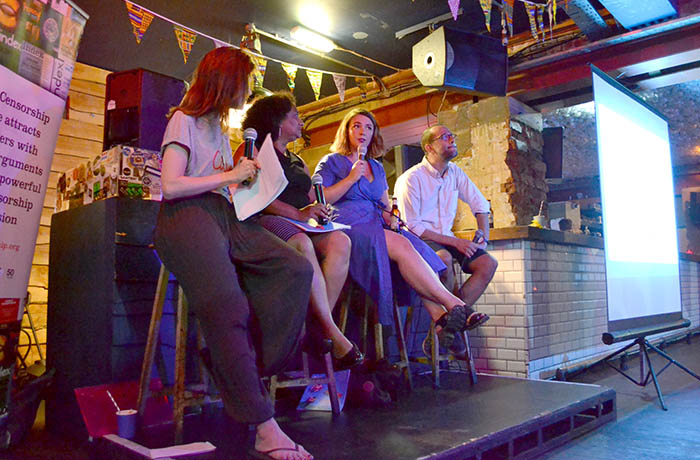
Vicky Baker, Meera Selva, Harriet Fitch Little and Benji Lanyado. Credit: Rosie Gilbey
“I would always err towards saying go rather than don’t go,” said Benji Lanyado, travel writer and founder of picture agency Picfair, speaking at a panel debate to launch the summer 2018 issue of Index on Censorship magazine.
The latest issue of the magazine, Trouble in Paradise, looks at the free speech issues that are prominent in certain top travel destinations, and yet are often overlooked by tourists and the tourist industry. Countries covered included Mexico, Malta, the Philippines and the Maldives. For the launch, a panel of travel writers and editors shared their thoughts on the roles of writers to tell the full story, rather than the nice, PR holiday story, and discussed the free speech implications of travel.
Taking place at The Book Club in Shoreditch, London, Lanyado was joined by former foreign correspondent Meera Selva, and Harriet Fitch Little, a Financial Times writer. The discussion was chaired by Vicky Baker, a journalist at the BBC.
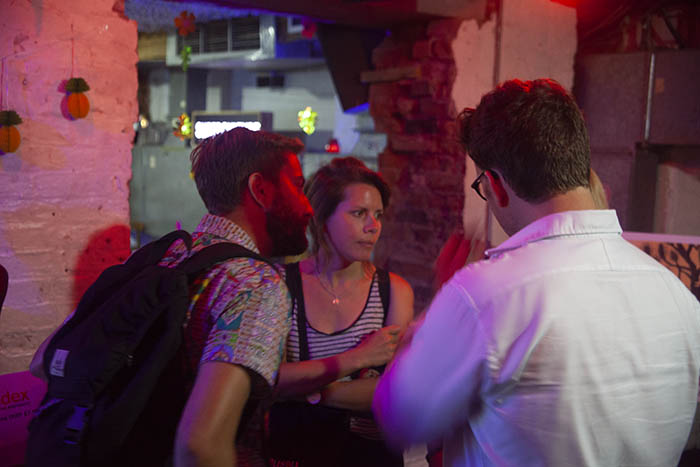
“The best travel writers do weave in the history and the politics of a place,” said Selva, while Fitch Little, talking about travel writing that might be paid for by travel companies or tourist boards as opposed to publications, said “there’s a way to write about a press trip that is fascinating and revealing.”
All panellists agreed on the value of speaking to locals in a destination, though they also acknowledged that doing so was not necessarily on the top of everyone’s holiday priority list, in particular families who might just want a nice break or might not have the budget for more adventurous travel – and that shouldn’t necessarily be condemned. “We all need escapism from time to time,” said Baker.
The panel also discussed whether travel journalists should write about problematic countries at all, raising questions about whether travelling to these places – and encouraging others to travel to them – benefits corrupt regimes.
“The best travel writers don’t just regurgitate the travel documents provided by the government,” Lanyado said.
“Sometimes you can get so obsessed by the pitfalls of a country and the leaders of a country that you forget about the people, and they can be totally different,” he added and asked whether boycotting a country was a form of censorship in its own right.
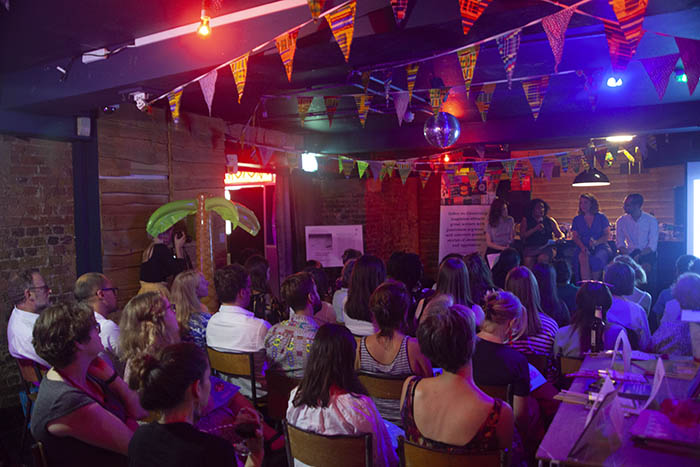
“If you don’t go, you don’t learn about the people,” said Baker.
Selva recalled a story of a travel journalist who went on a press trip to North Korea. While this journalist had first-hand experience of government propaganda, they also saw another side of the country when their bus driver did a detour into the countryside, heading off the beaten track. Had the travel journalist not gone, they would not have been able to report on this side.
The question of “ethical travel” was picked up by an audience member, Tina Urso from Malta, who spoke about Daphne Caruana Galizia, a Maltese journalist who was murdered on 16 October 2017 some 70 metres away from her home. Her death, which remains unsolved, exposed Malta’s dark side. There is now a memorial to Daphne opposite the central law courts in Valletta, the capital.
Urso said how this memorial is constantly dismantled, but that tourists, more so than locals, regularly rebuild it. She therefore saw the presence of tourists in Malta as playing a fundamental – and positive – role in highlighting these free speech abuses.
Finally, Fitch Little, who worked for local press in Lebanon and Cambodia, noted that there can sometimes be pressure coming from the other direction, namely pressure for writers to ham up the darker sides of destinations and that this too can conceal the real truth. She said how when writing about Cambodia, UK media often wanted a particular angle, usually one related to the Khmer Rouge.
Equally, when working for Time Out in Lebanon, her friends back home found it hard to believe that the country could have nice restaurants, for example, having seen the country in a more negative light. “Less sexy stories don’t get told,” she said.
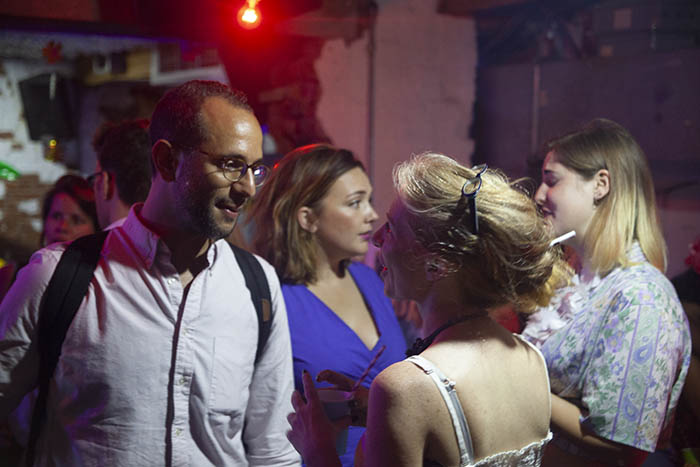
For more information on the summer issue of the magazine, click here. Included in the issue is an article from a Maltese journalist, Caroline Muscat, on corruption in the country, a look at journalists living under protection due to their reporting of the drug wars in Baja California Sur and an interview with Federica Angeli, a journalist who lives under 24-hour police protection following her exposé of the mafia in the pretty Italian seaside resort of Ostia.
[/vc_column_text][/vc_column][/vc_row][vc_row][vc_column width=”1/3″][vc_custom_heading text=”Trouble in Paradise”][vc_column_text]The summer 2018 issue of Index on Censorship magazine takes you on holiday, just a different kind of holiday. From Malta to the Maldives, we explore how freedom of expression is under attack in dream destinations around the world.
With: Martin Rowson, Jon Savage, Jonathan Tel [/vc_column_text][/vc_column][vc_column width=”1/3″][vc_single_image image=”100843″ img_size=”medium”][/vc_column][vc_column width=”1/3″][vc_custom_heading text=”Subscribe”][vc_column_text]In print, online. In your mailbox, on your iPad.
Subscription options from £18 or just £1.49 in the App Store for a digital issue.
Every subscriber helps support Index on Censorship’s projects around the world.
 SUBSCRIBE NOW[/vc_column_text][/vc_column][/vc_row]
SUBSCRIBE NOW[/vc_column_text][/vc_column][/vc_row]
30 Nov 2017 | Europe and Central Asia, Italy, Mapping Media Freedom, Media Freedom, media freedom featured, News and features
[vc_row][vc_column][vc_column_text]
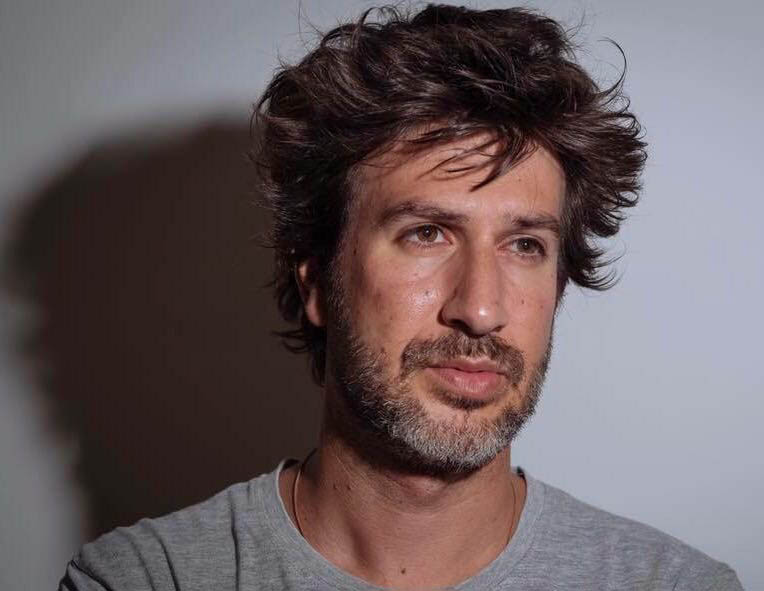
Italian journalist Lorenzo Tondo
On 10 November, like many days over the last two years, reporter Lorenzo Tondo was sitting in a courtroom in Palermo. A correspondent for The Guardian, he has been following closely the trial of an Eritrean man accused by Italian investigators of being at the helm of an international people-smuggling ring. Tondo was among the first to point out, through painstaking investigative work, that, in reality, the person standing in the dock might be a refugee, a victim in a case of mistaken identity.
So, when prosecutors announced new evidence had been filed during the latest hearing, Tondo was eager to get his hands on it. He rushed down to the records office, obtained a copy and started flicking through the hundreds of pages.
He was halfway through the documents when something odd caught his attention. His own name appeared: “Two conversations and a text between Haile Fishaye Tesfay and journalist Lorenzo Tondo, correspondent in Italy for the British newspaper The Gardian [sic] have been wiretapped,” the record states.
The investigators he had been covering for over a year, had listened to his private calls with a source and published the transcripts, in a violation of his professional rights.
“It was very hard to take in,” Tondo told Index on Censorship. “On one hand I suspected these sorts of things might be happening, knowing the environment in which I work. But I was shocked when I actually found out because I thought I had always acted in a transparent and responsible way.”
Tondo was particularly struck by how trivial the conversations published in the documents were. He was not commenting on or revealing information about any possible crime. Tesfay had been helping the reporter translate documents from Tigrinya, a language spoken in Eritrea, and they were now discussing his potential involvement in an upcoming documentary about the case. The transcript shows that, after Tesfay voiced his worries about being identified by people traffickers, Tondo assured his face would not be shown. This promise of anonymity was shattered by the investigators’ decision to release the wiretaps.
“They breached my rights,” Tondo said. “I abide by professional confidentiality and I need to defend my sources. I am not saying that journalist should be totally exempted from wiretapping if they are actually committing any crime. But if you realise the conversations are not relevant in the context of the investigation, I do not see any reason to publish them other than to discredit the person who, for over a year, has been pointing out your mistakes.”
Albeit disturbing, Tondo’s wiretapping is far from an isolated case of the Italian judiciary’s intrusion into the work of Italian reporters. Journalists have been secretly recorded on a number of recent occasions. Even more commonplace is the practice to serve media outlets or individual reporters with orders to hand over evidence and journalistic material. Just a few days after Tondo’s case emerged, officers from Guardia di Finanza, Italy’s financial police, raided the newsrooms of Il Sole 24 Ore and La Verita, two national dailies, and seized the digital archives of journalists Nicola Borzi and Francesco Bonazzi respectively. The two had just published articles, based on leaked information, detailing the links between Italy’s spying agencies and Banco Popolare di Vicenza, a bank currently in liquidation.
Although some newspapers have expressed concern and the journalists’ association denounced the violations, these episodes have largely gone unnoticed by mainstream public debate.
For Tondo, bugging a reporter or seizing their information has become so commonplace that it is not news anymore. “As wiretapping is such standard practice in Italian investigations, there are many precedents [of journalists being recorded]. So it is no longer that surprising. Italians have become dangerously inured to this, while abroad there is much more outrage.”
As Tondo pointed out, wiretapping forms an integral part of most investigations in Italy. In indictments, the bulk of the evidence is extremely likely to be drawn from secretly recorded conversations. Their wholesale use dates back to the bloody mafia wars of the early 1990s, when the Sicilian crime syndicate, Cosa Nostra, routinely killed prosecutors, judges and politicians, threatening the very foundations of the national democratic state.
In the fightback that followed, investigators have been granted wide-ranging powers. A strategy that has been successful in curbing the power of mafias, but which may have worrying side effects.
“There is a fundamental difference between the use of these tools and their abuse,” Tondo said. “In Italy many prosecutors are overusing them.”
In his case, Tondo argues that by publishing a transcript of his wiretapped conversations prosecutors might not only have violated his professional rights but also potentially broken a law.
Article 271 of the Italian criminal code forbids the use of wiretapped conversations of a range of professionals, including journalists, when they would reveal confidential information obtained because of their role.
“Even if there is no legal implication for myself, I believe it is my duty to defend my rights,” Tondo added. “This is a fair battle to fight because at stake is not only my work but, more importantly, that of many other reporters like us.”
After taking legal advice, Tondo is now evaluating the best course of action to protect himself from further intrusions. In the meantime, his work to lay bare what he believes to be an egregious miscarriage of justice continues. Despite the working situation in Palermo is becoming increasingly tough for him. Criticising the local prosecutors’ office cut his access to a steady flow of information and made many colleagues, relying on investigators for their exclusives, turn their backs on him.
“This case made me understand how visceral the relationship between journalists and the judiciary in Palermo is,” Tondo said. “Many reporters here have become press officers for the prosecutors. They have lost their independence, their impartiality. This closeness becomes a problem when that same authority makes a mistake. And if you try and leave this ‘private circle’ you become marginalised.”
[/vc_column_text][/vc_column][/vc_row][vc_row][vc_column][vc_basic_grid post_type=”post” max_items=”4″ element_width=”6″ grid_id=”vc_gid:1512050345577-4d6f8ba3-9c7a-2″ taxonomies=”193″][/vc_column][/vc_row]
19 Sep 2017 | Europe and Central Asia, Italy, Mapping Media Freedom, News and features
[vc_row][vc_column][vc_column_text]
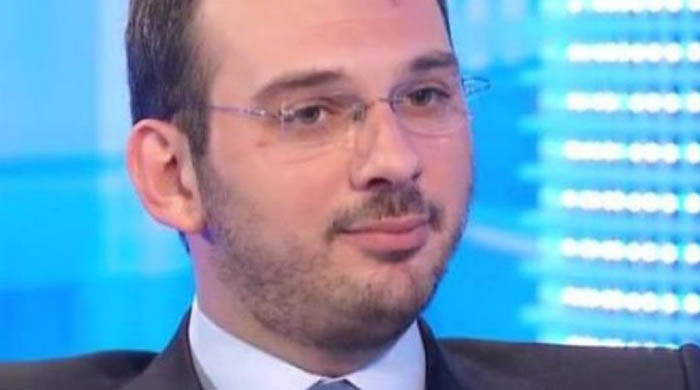
Italian journalist Paolo Borrometi.
Italian journalist Paolo Borrometi was forced to move to Rome from Sicily because of threats he was receiving connected with his reporting on organised crime. Borrometi’s story is far from unique. He is one of the 20 journalists currently under police escort in Italy.
In May 2014, Borrometi was beaten by two hooded men near his home after he asked citizens to report any relevant information to investigators about a two-year-old murder. The assault did not deter his reporting on organised crime, nor did a vandalism incident in which the front door of his parent’s home was destroyed in an arson attack.
Despite being forced to relocate to Rome for security reasons, Borrometi’s work uncovering mafia activities continued, as did the almost constant intimidation he faced. This summer a group of unidentified people raided his home, stealing computer hard disks and a series of documents related to his investigations.
The Italian Interior Ministry released official figures of the number of journalists under police protection for the first time in June 2017 to highlight the growing phenomenon.
Borrometi works as editor-in-chief of a local webzine, LaSpia.it, and is a contributor to several other media outlets as a freelancer. Without a regular salary, he needs to keep publishing to earn a living. Many Italian journalists are in the same position financially. According to Nicola Marini, a board member of the Association of Journalists (Ordine dei Giornalisti), which monitors the ethical conduct of journalists, eight out of ten Italian journalists earn less than €10,000 per year.
Beppe Giulietti, the president of the Italian journalists’ trade union FNSI, recounted a conversation he had with Borrometi after the interior ministry decided to put him under escort: “He was worried this situation could interfere with his job.” For freelance reporters a mafia threat does not just affect personal safety, it creates a serious obstacle to performing their jobs. Conducting a simple interview becomes a lot harder when the reporter is followed by a group of policemen. But without them, Borrometi’s life would be in serious danger.
“Compared to the past, the current situation for journalists shows fewer mafia killings,” Giulietti told Index on Censorship. “But sometimes physical threats are not necessary.”
Indeed the economic situation for Italian journalists is harsh and, as Giulietti said, “a defamation lawsuit could be as lethal as a bullet”. Many journalists stop working on investigations because of the risk of lawsuits. If they were sued they wouldn’t be able to afford the economic risks. The result is self-censorship.
Many lawsuits have no legal basis. The Italian permanent observatory on threats to journalists, Ossigeno, estimates that one-third of defamation claims in Italy originate from allegedly mafia-connected people or lobbies.
These cases are often civil and the plaintiff demands enormous amounts of money even though the claim is created as a pretext and the alleged damage is minimal. Quite often the aim is only to intimidate.
The financial fragility of journalists has led to a phenomenon that Alberto Spampinato, president of Ossigeno, calls “the Italian paradox”. Italy has a long history of journalists killed by mafia-affiliated killers, especially during the late 1980s and 1990s. This situation brings growing attention to the link between freedom of information and organised crime.
After an initially strong reaction from the public, things usually turn silent. Ossigeno, which was founded in 2007 after three journalists and writers – Roberto Saviano, Lirio Abbate and Rosaria Capacchione – were put under police escort, aims to put a continuous spotlight on threats to journalists. The Italian public is aware of the problem but politicians are not reactive, according to both Spampinato and Giulietti. Freedom of information, especially related to the nexus between organised crime, politics and corruption is constantly under siege.
The Italian parliament is currently discussing a new law to avoid the complete transcriptions of the intercepted conversations, “but no one is taking care of the lawsuits based on weak grounds which are only made to intimidate journalists (in Italian defined as “querela temeraria”), although the trade union has already highlighted this problem,” Giulietti said. The president of the journalists’ trade union wants to stress how politicians are focused only in amending the system not to publish news that could affect them, rather than amending a concrete vulnus in freedom of journalists.
According to the latest Ossigeno report, reporting on organised crime is harder for people who live in remote places. Local journalists often feel pressure from local officials and criminal syndicated, Spampinato explained.
For example, in Rho, a small town in the outskirts of Milan, the newsroom of the local newspaper, Settegiorni, was vandalised by a group of unknown people three times in three months, the latest incident occurring on 3 September. The newspaper has been working on an investigation about the presence of the criminal syndicate ‘Ndrangheta in Rho, according to editor-in-chief Angelo Baiguini.
Though politicians are slow to act, some parts of the Italian parliament are monitoring the situation. The Parliamentary Anti-Mafia Commission set up a Committee on Mafia, Journalism and Media. In August 2015 the Committee highlighted that there are southern Italian regions where media publishers have an “opaque management”, involved in judiciary case, even for alleged external support to mafia syndications. Obviously they are willing to stop muckrakers digging into their businesses.
Up until now, there have been no solutions to this problem from a legal perspective. This leaves many good reporters at risk and makes in-depth reporting about organised crime ever more difficult. [/vc_column_text][/vc_column][/vc_row][vc_row][vc_column][vc_basic_grid post_type=”post” max_items=”4″ element_width=”6″ grid_id=”vc_gid:1505821805138-929619f7-ec4b-9″ taxonomies=”193, 6564″][/vc_column][/vc_row]
4 Aug 2016 | Europe and Central Asia, News and features, Turkey, Turkey Uncensored
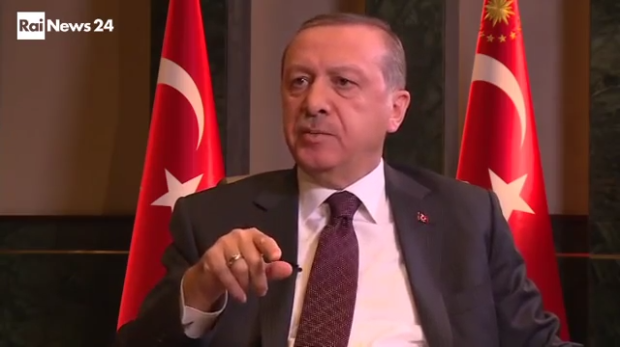
Turkish president Recep Tayyip Erdogan interviewed on Italy’s RAI News 24
Turkey’s third post-coup week has been full of uncertainties, suspicion and concern. As of Wednesday morning there were 1,297 individuals subject to an international travel ban, among them 35 journalists and 51 lawyers.
A developing rift between Ankara and Rome illustrates what Turks can expect from the government-controlled and -aligned media: a moulding of the truth to fit the words and agenda of the country’s president.
In a combative interview with Italy’s RAI News 24, president Recep Tayyip Erdogan challenged the Italian government’s investigation of his son Bilal. He warned that the incident would put Turkey’s relations with Italy “in difficulty”.
“If my son had entered Italy, he would perhaps be arrested. What is this? My son, who is a bright man, is accused of money laundering. Instead of hassling my son, Italy should deal with its own mafia,” he said angrily.
His anger spilled over to the city of Bologna as well. “In that city they call me a dictator,” Erdogan said. “They organise pro-PKK demonstrations. Why don’t they [Italian authorities] step in? This issue will jeopardise our relations with Italy.”
Later, Italy’s prime minister, Matteo Renzi, responded on Twitter: ”In this country the judges respond to the laws and the Italian constitution, not the Turkish president. It’s called ‘rule of law.'”
It’s unnerving how this not-so-diplomatic sparring played out in the Turkish press. While Erdogan’s words were widely quoted on TV channels, the Italian prime minister’s reaction was missing. As media-monitoring organisations pointed out, half of reality was missing, self-censored by subservient outlets under the president’s thumb.
Erol Önderoğlu, Reporters Without Borders’ Turkey representative, asked via Twitter whether or not Turkish TV channels would consider reporting Renzi’s “rule of law” comments. Sadly, he knew they wouldn’t.
It goes further, though. As if self-censorship wasn’t enough, the government moved to block access to articles about the money laundering allegations against Bilal Erdogan following the RAI interview. Cumhuriyet — one of the handful of independent media outlets remaining — reported that Diken and Gazeteport — already under the eye of the government — were sites that had their coverage censored.
At the same time, behind the smokescreen of a subservient press, the Erdogan administration has turned its oppressive measures on Kurdish journalists. Police in the Karayazı District of Erzurum Province detained Mehmet Arslan, a reporter for Dicle News Agency (DİHA). Turkish telecommunications regulator, TIB, blocked access to the website of JİNHA news agency, which mainly covers Kurdish issues.
Journalists on social media were warning authorities that there was a high risk that a journalist in detention, Haşim Söylemez, who recently had two successive brain surgeries, could face health issues in jail.
A colleague of his, briefly arrested with Söylemez, tweeted that “he had a hard time even standing up in the cell”.
Önderoğlu is as deeply concerned as I am about the coming weeks. He said in next four months at least 149 journalists will be facing courts and, due to emergency rule practices, there will be many legal inquiries underway about the others, mainly based on the Anti-Terror Law and the Criminal Code.

Turkey Uncensored is an Index on Censorship project to publish a series of articles from censored Turkish writers, artists and translators.

![]() SUBSCRIBE NOW[/vc_column_text][/vc_column][/vc_row]
SUBSCRIBE NOW[/vc_column_text][/vc_column][/vc_row]






